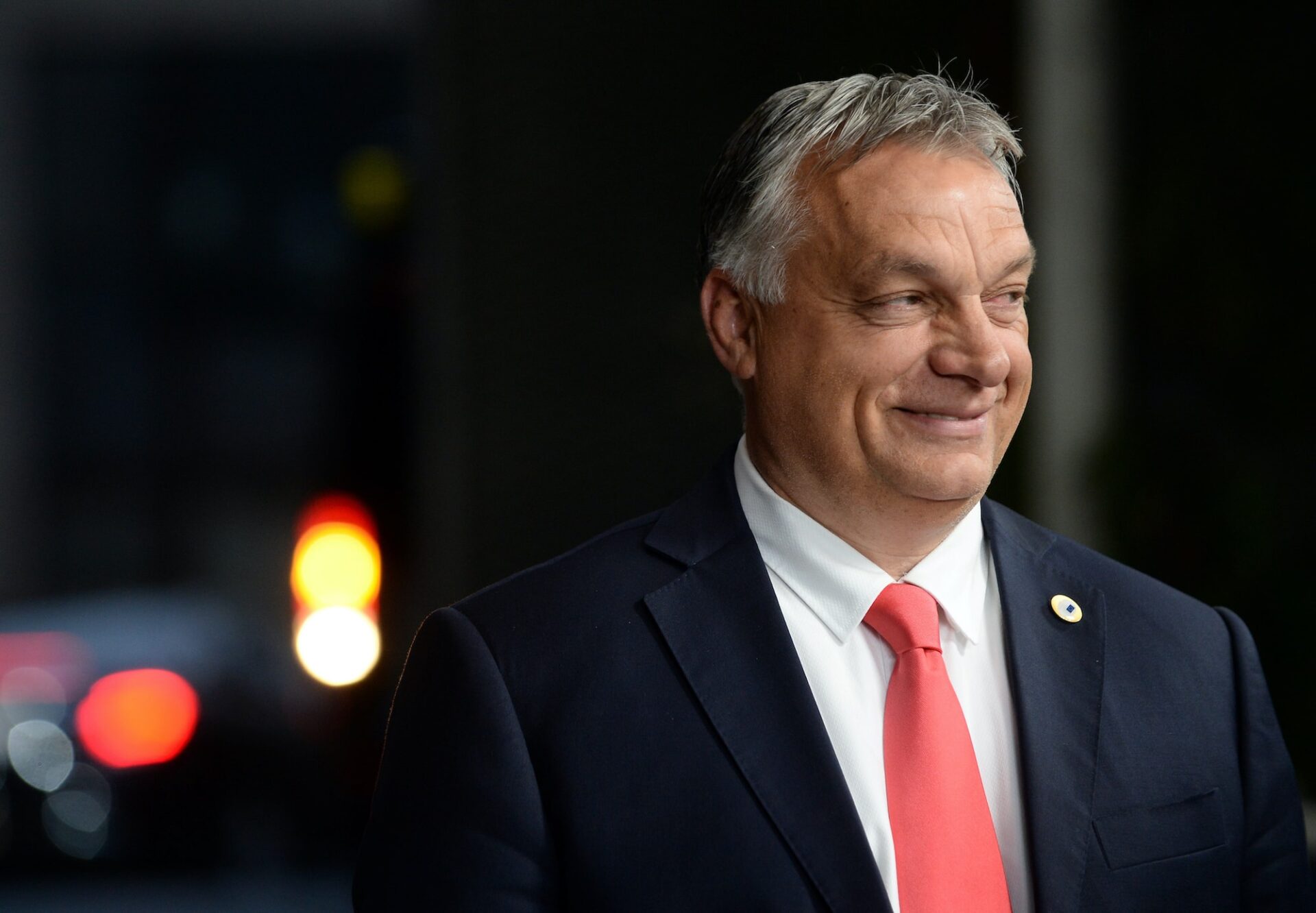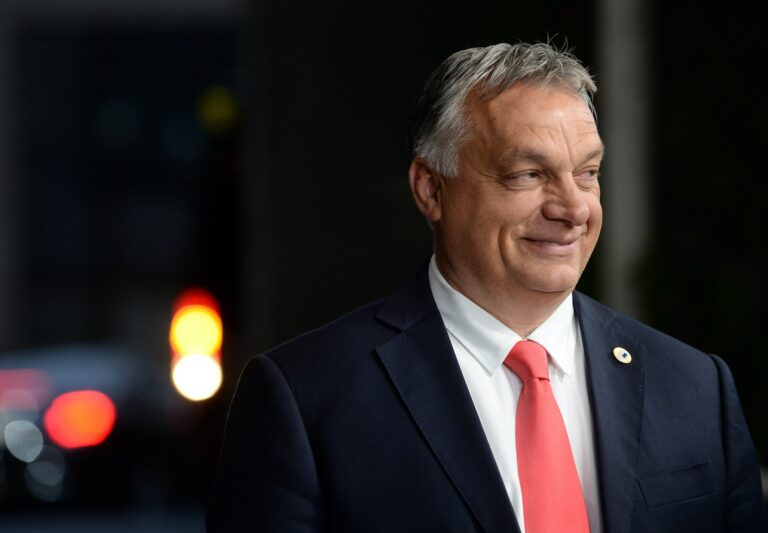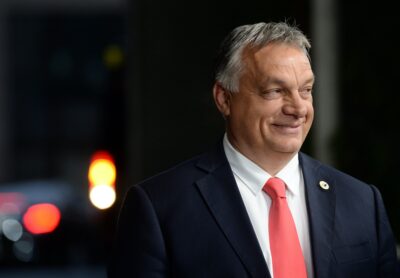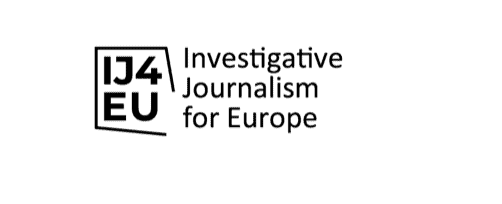The Hungarian Center for Fundamental Rights, one of the Polish organization Ordo Iuris’s main partners in the fight against the Istanbul Convention, has close ties to PM Viktor Orbán. Funded by public money, it spreads pro-government propaganda.
Ordo Iuris and the Hungarian Center for Fundamental Rights have recently announced the creation of a new international network of “conservative forces” to support the “national conservative awakening of Europe” – and oppose what they call “globalist liberalism.”
We are thrilled to welcome @OrdoIuris in #Budapest. We aim to preserve and bolster traditional #EuropeanValues & our #JudeoChristian heritage.
We’re working on expanding our collaboration to include other regional institutes, who might join us next time we meet in lovely #Warsaw. https://t.co/LqM0zllger— The Center (@alapjogokert) April 16, 2021
The Hungarian partner of Ordo Iuris previously met in Warsaw with the Polish deputy minister of justice, Sebastian Kaleta (Solidarna Polska/United Poland), and deputy minister of foreign affairs, Paweł Jabłoński (a former expert at Ordo Iuris). Both organizations are closely cooperating to fight the Istanbul Convention against domestic violence.
Konzervatív erők európai szintű együttműködését tervezi az Alapjogokért Központ a lengyel Ordo Iuris-szal.
▪️A 2020…
Posted by Alapjogokért Központ on Monday, February 8, 2021
1.
“During these cold evenings, nothing beats having a hot tea while reading a book,” purrs legal analyst Eszter Párkányi on a slickly produced video. She then holds up a book to the camera, recommending it to her viewers. The Savoy blue cover matching the shade of Párkányi’s nail polish depicts a woman’s face sporting a moustache below the title: Gender Craze: A Manual to Understanding the Global Master Plan.
Originally written by Belgian-American anti-gender guru Marguerite A. Peeters, Gender Craze was translated into Hungarian and published by Párkányi’s employer, the Center for Fundamental Rights last October. For Hungarians, Párkányi effectively became the face of the book as she was invited to the studios of various television channels run by or allied with the government to discuss it on air. “Feminists have allied with homosexuals and managed to get homosexuality more accepted in Western societies. […] The next step, where I believe we’re at right now, is making people accept transsexuals. And they’re already laying the groundwork for pedophilia to be accepted,” explained Párkányi on Pesti TV while promoting Gender Craze. The channel is financed by Lőrinc Mészáros, the richest man in Hungary and childhood friend of PM Viktor Orbán.
But Gender Craze is just a drop in the ocean when it comes to Orbán’s influencing the mainstream public discourse in Hungary, as NGOs allied with and funded by Orbán’s government, such as the Center for Fundamental Rights, flood friendly media with misogynous and homophobic messages under the anti-gender flag.
In 2017, opposition politicians allied with women’s rights NGOs tried to put public pressure on the government to hasten the ratification of the Istanbul Convention, which Hungary had signed three years earlier. “We’re working on speeding up the process,” blabbered an MP from Orbán’s Fidesz party in front of television cameras. Then NGOs allied with Fidesz set out to work on the public.
In a public statement, the Center for Fundamental Rights asked the government to say “no to the gender convention.” CitizenGO, a conservative international online petition platform, took a similar statement from another government-friendly NGO, Emberi Méltóság Központ, and turned it into a petition, which was then signed by some 6,000 people. “I don’t think an initiative supported by more than 6,000 people can be easily cast aside,” explained another Fidesz MP at a meeting of the parliamentary committee for justice, signalling the indefinite shelving of any plans of ratification.
Since then, Orbán’s party has officially done an about-face: in 2020, the Parliament — in which Fidesz enjoys a majority — voted to approve a statement to “reject that the scope of the Istanbul Convention should include Hungary and the European Union.”
“Before the announcement, the state secretary presiding over the [women’s rights] committee told us, somewhat cynically, that there was no political will on the part of the government” to actually implement the convention, recalled Noá Nógrádi. Nógrádi is a policy expert and member of PATENT and NANE, two women’s rights organizations that have been providing victim support services for decades. In recent years, she has represented these NGOs on various government-run consultative committees, but she says their input is regularly discarded. She also believes that other organizations have a backchannel to the government.
“My impression is that they coordinate things behind the scenes. It’s obvious who’s chummy and who isn’t. There’s always knowing looks and smiles between the officials representing the government and people from certain NGOs,” said Nógrádi, before reciting a short list of organizations, foremost of which was the Center for Fundamental Rights.
2.
The Center for Fundamental Rights is a legal research institute producing a never-ending amount of legal papers and providing talking heads that prop up Orbán’s agenda in the media. The organization, envisioned to counterbalance “liberal” NGOs working in the legal sphere, was established in 2013 as Jogállam és Igazság Nonprofit Kft. (Rule of Law and Justice – the company is still behind the organization) by Miklós Szánthó, a lawyer with ties to Fidesz. In addition to the Center for Fundamental Rights, Szánthó currently presides over the board of KESMA, a gigantic government-allied media conglomerate.
According to documents Atlatszo has seen, the PM’s Cabinet Office covertly provided the Center for Fundamental Rights a series of publicly funded grants.
On paper, the Cabinet Office awarded the grants to the Batthyány Lajos Alapítvány (BLA) foundation, but this little-known organization served only as a conduit for channeling cash. While BLA did not reply to our questions sent by email, in the documents we have seen the Center for Fundamental Rights was named several times as the ultimate beneficiary of these grants, which totaled at least 2.53 million euros between 2018 and 2020.
According to the annual financial reports of Jogállam és Igazság Nonprofit Kft., the company behind the Center for Fundamental Rights, these grants constituted nearly all the center’s income in these years. The organization did not have to work much for this money: one of the contracts we have seen actually specified that the institute “was devoid of any obligation” to do anything in exchange for receiving funding.
The PM’s Cabinet Office — the ultimate funder of the scheme — is run by Fidesz politician Antal Rogán and headed up propaganda campaigns such as the one trying to convince voters that George Soros was sending masses of refugees to destroy Hungary. Experts researching anti-gender campaigns believe that as the government gears up for the 2022 national elections in its propaganda it has replaced migrants as the faces of ultimate evil with feminists and LGBT people.
“Government politicians aren’t really talking about the Istanbul Convention anymore. Now they talk about gender ideology, which is supposed to mean the same thing: that there are these evil people who endanger the traditional Hungarian way of life,” explains Nógrádi. She sees this “gender ideology” as an easy strawman for the government to fight against. “They make believe that when the convention talks about gender, it talks about identity. In fact, it does not. It simply describes violence against women as gender-based violence against women, as a particular kind of violence that is based in the hierachical social norms and roles attached to men and women — which is a reality. The Hungarian government does not want to see this.”
In December, the Parliament voted to effectively ban singles from adopting, targeting LGBT people but also barring other unmarried people from raising children who would otherwise be left to the care of the state. At a campaign appearance a year earlier, the speaker of the house, László Kövér, Orbán’s longtime ally, reportedly likened LGBT people who want to adopt children to pedophiles: “In both case the child is an object, a luxury good, a tool of self-fulfilment.”
According to Roman Kuhar and David Paternotte, the editors of the “Anti-Gender campaigns in Europe”, the notion of gender ideology was originally invented in the Vatican.
“Gender ideology is a new type of heresy that has found fertile ground in the European crisis of identity,” explains Párkányi in her Gender Craze promotional video. According to the Center for Fundamental Rights’ précis on Marguerite A. Peeters’s book, this ideology is pushed by “gender-feminists and homosexuals’” who attack “marriage and the family.” The center sees hope though, as “more and more men and women seek to liberate themselves from the manipulators of the Western cultural revolution” with the help of ”non-Western cultures, so far free of the stain of gender activists.”
When actors close to the Roman Catholic Church first tried to spread the idea of a nefarious “gender ideology” threatening Hungary, the notion did not catch on. In 2016, prominent female pundits from the European anti-gender scene, such as Peeters and Gabrielle Kuby, had books published by the newly established John Henry Newman College in Sümeg and were even invited to lecture there. The college — a self-professed Christian endeavour, which enjoyed the support of several leading Hungarian Catholic figures — never got off the ground due to a police investigation into the alleged misappropriation of certain funds received from foundations associated with the Central Bank of Hungary.
At that time, Peeters traveled to Budapest to give a talk about one of her books. A video recording of the event shows that only a few dozen sleepy-looking people came to see the author, who was introduced to the audience by Catholic bishop János Székely. The massive public interest garnered by the very same author only four years later is a testament to the efficiency of Orbán’s propaganda machinery.
Characters from the Christian fringe, such as former neo-Nazi Péter Szász, now make regular appearances in Fidesz-friendly media outlets. Over the last two years, the “Christian” anti-gender news site Vasarnap.hu has been built from near scratch thanks to grants its publisher, the Kovács K. Zoltán foundation, received, including 58,000 euros from the PM’s Office to support awareness-raising about persecuted Christians and 280,000 euros from the Ministry of Human Resources for training and marketing Christian pop musicians.
3.
The lines between politicians, government-organized NGOs, and Fidesz-allied media are blurry. Take, for example, Axióma, a foundation registered by Áron Giró-Szász in 2019. The 28-year-old Giró-Szász is Orbán’s commissioner for keeping in touch with and supporting Christian movements, as well as a former university classmate and friend of the PM’s firstborn son, Gáspár Orbán. Its sources of income unknown, Axióma produces animated videos that comment upon social issues, such as “gender ideology”— but it denies that it can be legally qualified as a media outlet.
Katalin Novák, the minister for families, recently appeared in an Axióma video to explain that women should be content with receiving lower pay, holding worse positions, and having more burdens than men. Though the recording drew some backlash, Novák is still the public face of family issues in Hungary.
‼️És arról hallottak már, hogy az Európai Parlament egy legújabb javaslatában “az LMBTIQ-szabadság zónájáva” kívánja…
Posted by Alapjogokért Központ on Tuesday, March 9, 2021
Novák’s stable rise as a Fidesz politician in Orbán’s successive administrations since the party’s landslide electoral victory of 2010 can be in no small part attributed to her championing of “traditional family values.” Novák, who is fluent in English, French, and Spanish in addition to Hungarian, started her political career in the foreign ministry, and was eventually appointed state secretary for families in 2014. Now she is seen as one of the most important faces of Fidesz.
“I’ve been taking part in arguments [with the European Commission] for seven years now, and I could endlessly recite those documents with an undercurrent of gender ideology, which they want to force on us,” she explained in an interview last year. “Naturally, in these wars of ideas we need allies.”
Where has Novák looked for these allies? In 2017, she hosted the Budapest Family Summit — a four-day jamboree including various smaller events, such as the annual World Congress of Families (WCF) conference and the One of Us forum, which brought together European pro-life organizations.
The Illinois-based WCF’s role in connecting pro-life Christian fundamentalists from the United States with the Russian Orthodox Church and Russian oligarchs backing the family agenda has been well documented. Under the guise of “defending the family,” WCF supports anti-gay and anti-abortion policies worldwide — such as policies targeting homesexuals in Russia, which drew widespread international criticism when the Winter Olympics were held in Sochi in 2014.
That same year, WCF’s annual conference, planned for Moscow, was called off after the Western condemnation of Russia’s role in the Russian-Ukrainian war, which was followed by international sanctions that included putting Vladimir Yakunin, the then-president of Russian Railways who has ties to the WCF, on the US sanction list. However, the event, now rebranded, still went on with the Russian government playing an organizing role.
Hungary was the only EU member to send a government official, Ministry of Human Resources undersecretary Gergely Prőhle, a close colleague of Novák when they both worked under the minister of human resources, Zoltán Balog, a Calvinist priest. The ministry later explained that the Hungarian government sent a rank-and-file official, not a political appointee.
Prőhle told VSquare he considered the conference a “most jolly gathering” in the Kremlin, where he gave an “objective speech on family-related developments in Hungarian law.” He also noted that the invitation was originally addressed to Balog, who delegated the matter to Novák, who in the end sent Prőhle in her place. He did not remember who invited the minister or who paid for his trip, but told us that he still cherishes a keepsake he got there: a pin with a Russian inscription reading “Many children — good.”
Before the conference was rebranded, Katalin Novák was slated to represent the Hungarian government, according to emails leaked by Shaltai Boltai, a Russian hacker group. The emails probably originated from a former Russian official with ties to ultranationalist philosopher Alexander Dugin’s Eurasianist movement. Investigative journalists at BuzzFeedNews.com have also revealed that Russian nationalists and social conservatives appear to be working together to use links with “pro-family” organizations in the United States and around the world to promote Russia’s geopolitical agenda.
According to a list of possible conference participants, Novák’s plane ticket to Moscow was to be funded by the Foundation of St. Andrew the First Called, chaired by Vladimir Yakunin. Her invitation allegedly came from Igor Beloborodov, the head of the Department of Demography and Population of Russia’s Institute for Strategic Studies (RISS). Western critics say that RISS provides the framework and rationale for propaganda operations, and possibly engages in election meddling, whereas in Russia it is known as a place where former intelligence officers go into “semi-retirement.”
Novák’s press office did not reply to an email asking to confirm the veracity of the information relating to her in the leaks. But RISS’s website published a letter from Novák thanking Beloborodov for participating in a 2015 demographic summit in Budapest. The list of speakers at a 2017 summit in Budapest also includes Beloborodov.
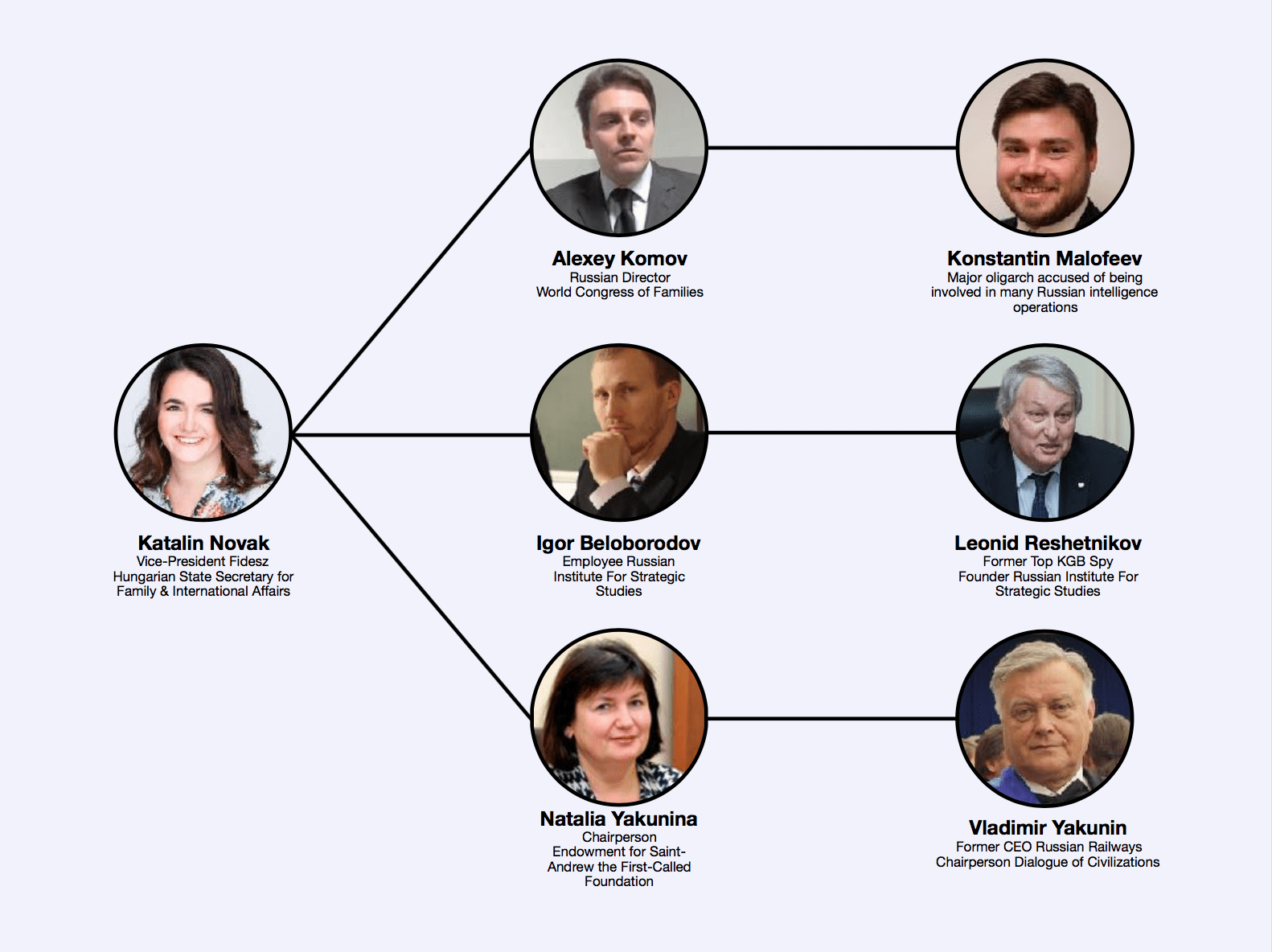
Katalin Novak was approached by many Russian individuals close to intelligence operations (the lines mean personal connections). Source: https://remybonny.com/
According to Rémy Bonny, a Belgian political scientist and LGBTQI activist, “Russia’s international fight against LGBTI rights is an inherent part of its strategy to undermine the European Union’s liberal democracy. Through international homophobic networks, Russian intelligence made contacts with Hungarian government representatives. Since then, LGBTI rights in Hungary have been going backwards, and the country has been vetoing the evolution of LGBTI rights at the EU level. Hungary’s contacts with Russia endanger its (and the EU’s) national security.”
“There have been interactions between very questionable Russian individuals and Hungarian policy actors on these ultraconservative issues,” Bonny told VSquare.
Questionable Russian individuals also have ties to CitizenGO, the international online platform that in Hungary supported a petition arguing for Fidesz to postpone ratifying the Istanbul Convention in 2017. According to the cache of leaked emails published by Polish feminist movement activist Klementyna Suchanow, a CitizenGO board member, Alexey Komov – WCF representative that was involved in organizing the 2014 Moscow WCF – is also a close associate to devoutly Orthodox billionaire businessman Konstantin Malofeev.
In 2014, Malofeev was sanctioned for providing support to rebels in eastern Ukraine. In the very same year, he organized a secret conference in Vienna where Russian and European fundamentalists and nationalists contemplated how to save Europe from the “satanic” gay lobby. At least one speaker at the event hailed Russian president Vladimir Putin as a saviour.
CitizenGO has close ties to the government-friendly NGO scene in Hungary. Edit Frivaldszky, the head of the Human Dignity Center (Emberi Méltóság Központ), is also the former head of Hungarian operations for CitizenGO. Frivaldszky’s husband is a former politician from the KDNP party, a Christian fundamentalist ally of Fidesz. The current Hungarian at CitizenGO, Eszter Schittl-Zaymus, is also the former director of EMK.
Along with the Center for Fundamental Rights, EMK is another supporter of the online petition against the Istanbul Convention organized by Ordo Iuris in Poland.
4.
Katalin Novák now heads a newly established international initiative named Political Network for Values, which seems to focus on Spanish-speaking countries. One of its allies, the Spanish Familia Y Dignidad Humana, is headed by politician Lourdes Méndez, also a supernumerary member of Opus Dei. Among the experts and directors of the new initiative, we find well-known names from the global ultraconservative movement, such as Stefano Gennarini (C-Fam), Luca Volonte, Sophia Kuby (ADF), Ignacio Arsuaga (CitizenGO), and Brian Brown (WCF).
[Read more about C-Fam, ADF and WCF in part 4 of the report].
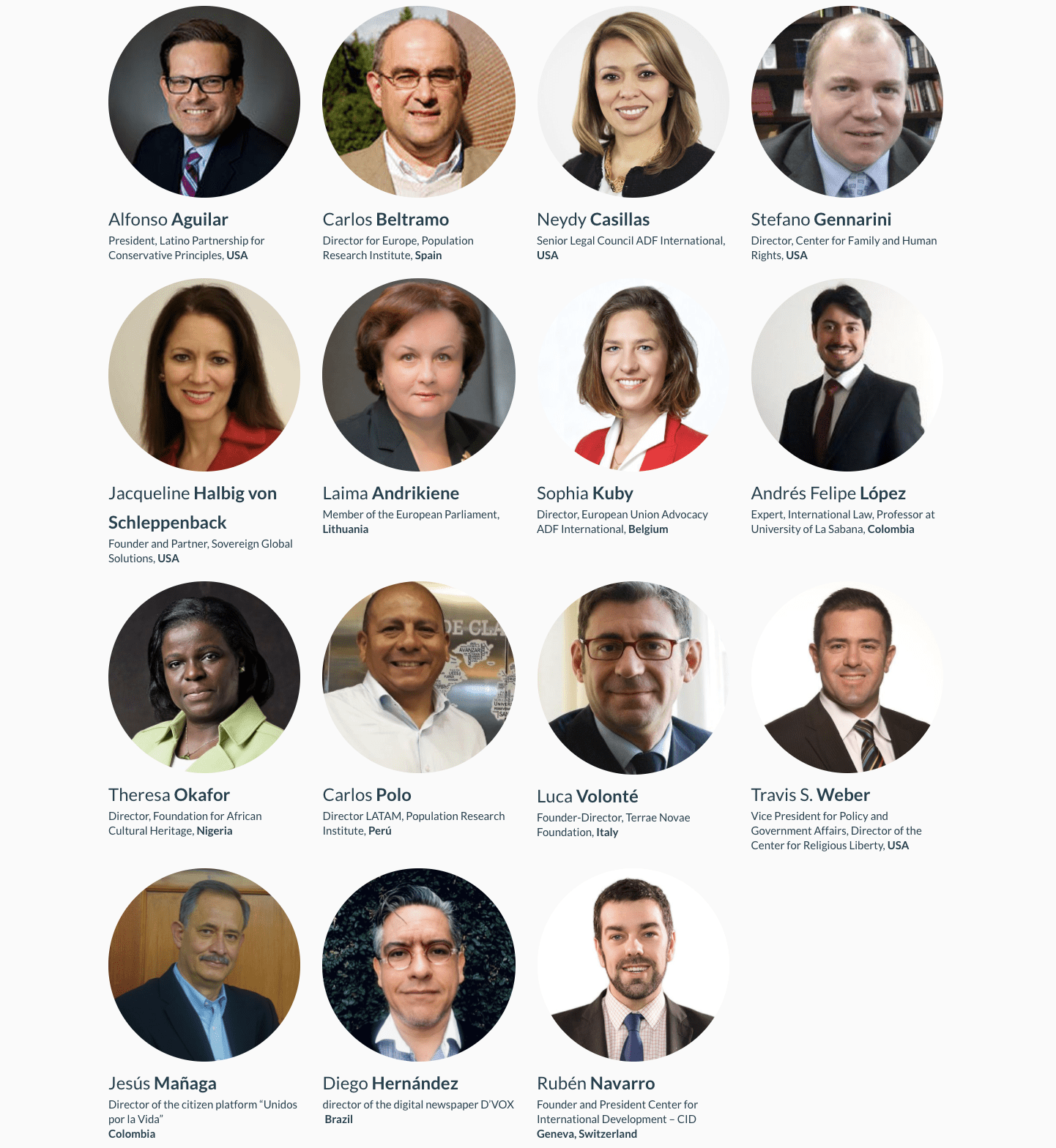
The Political Network for Values’ council of experts. Source: https://politicalnetworkforvalues.org/
Last year, the Hungarian government provided a 140,000 euro grant to the Political Network for Values. The network and its allied organizations plan to gather political representatives from Europe, the Americas, and other regions of the world at its fourth Transatlantic Summit, which will be held in the Hungarian Parliament in November 2021.
Cover photo: Hungarian Prime Minister Viktor Orban smiles as he departs from a meeting at the EU summit in Brussels, Belgium July 20, 2020. Source: JOHANNA GERON / Reuters / Forum
By Márton Sarkadi Nagy (Átlátszó, Hungary)
The production of this investigation was supported by a grant from the Investigative Journalism for Europe (IJ4EU) fund.

